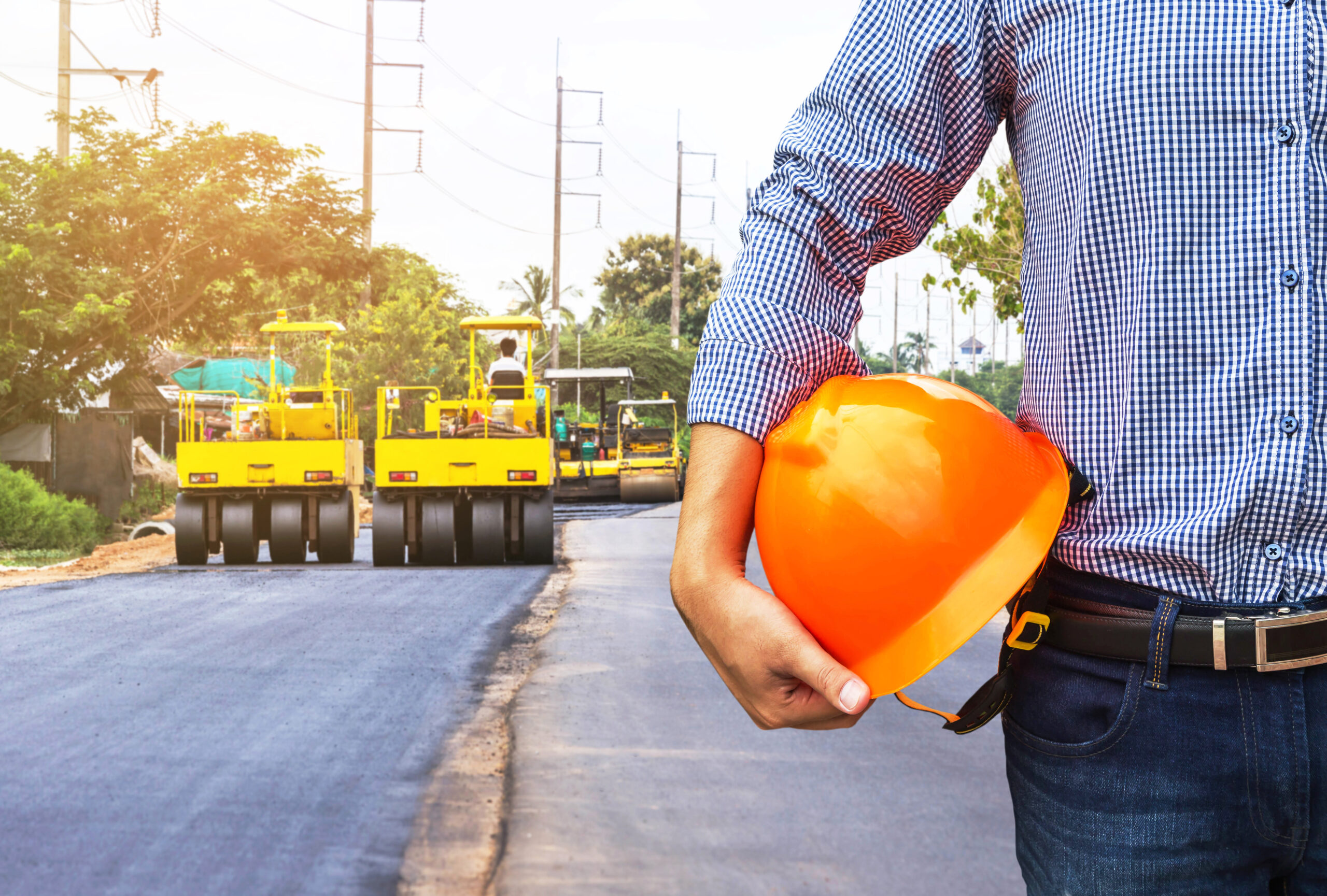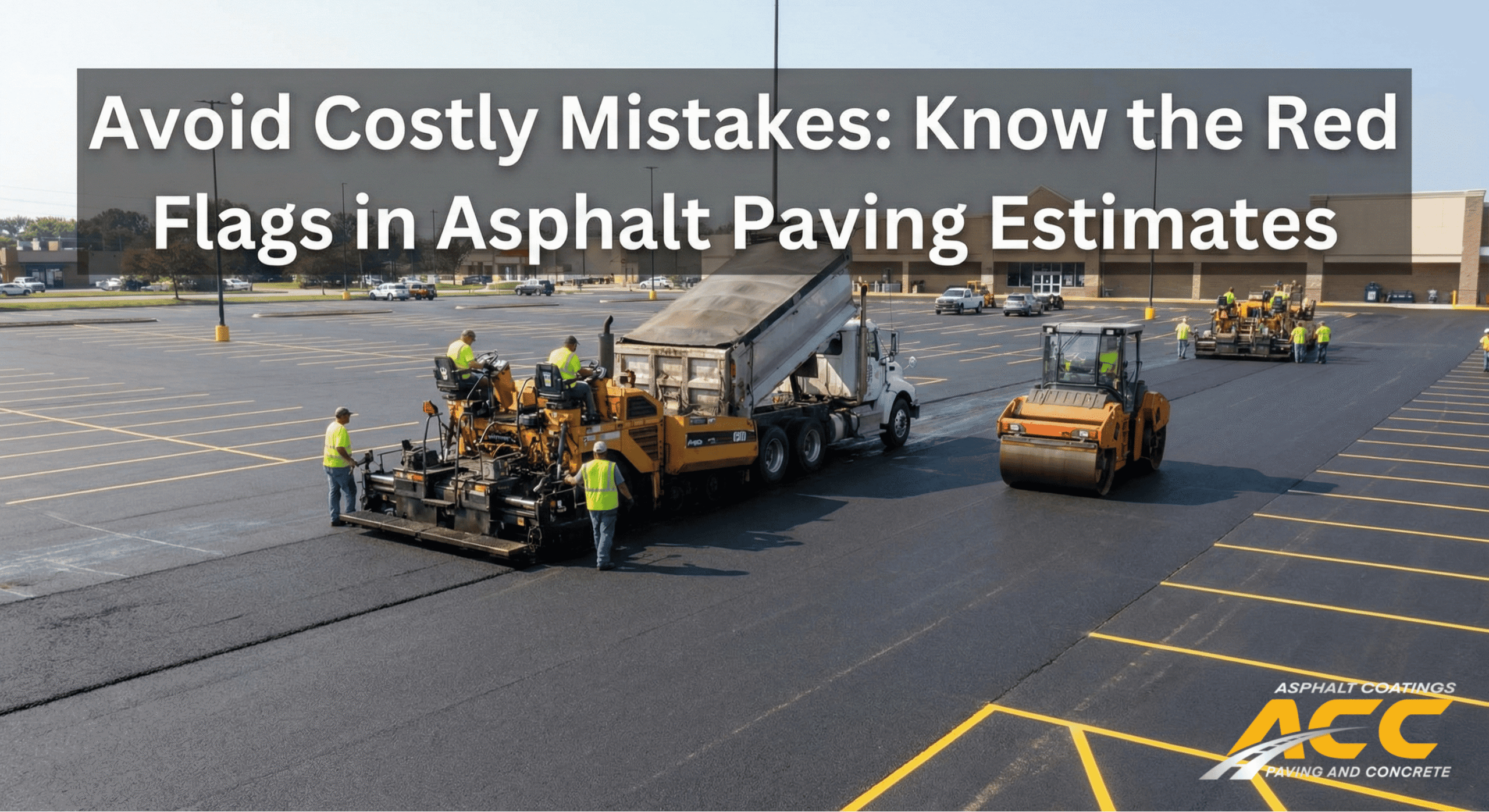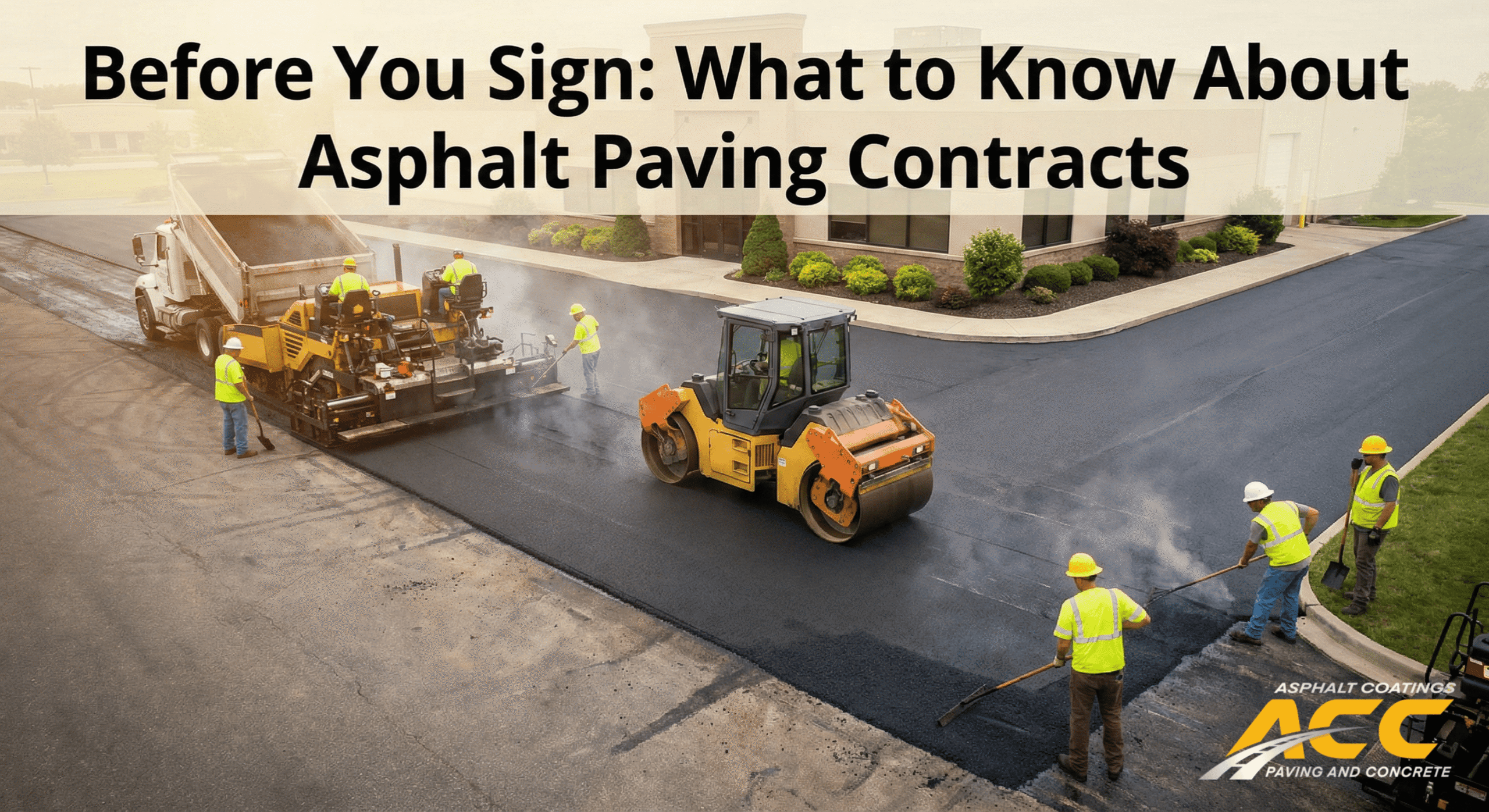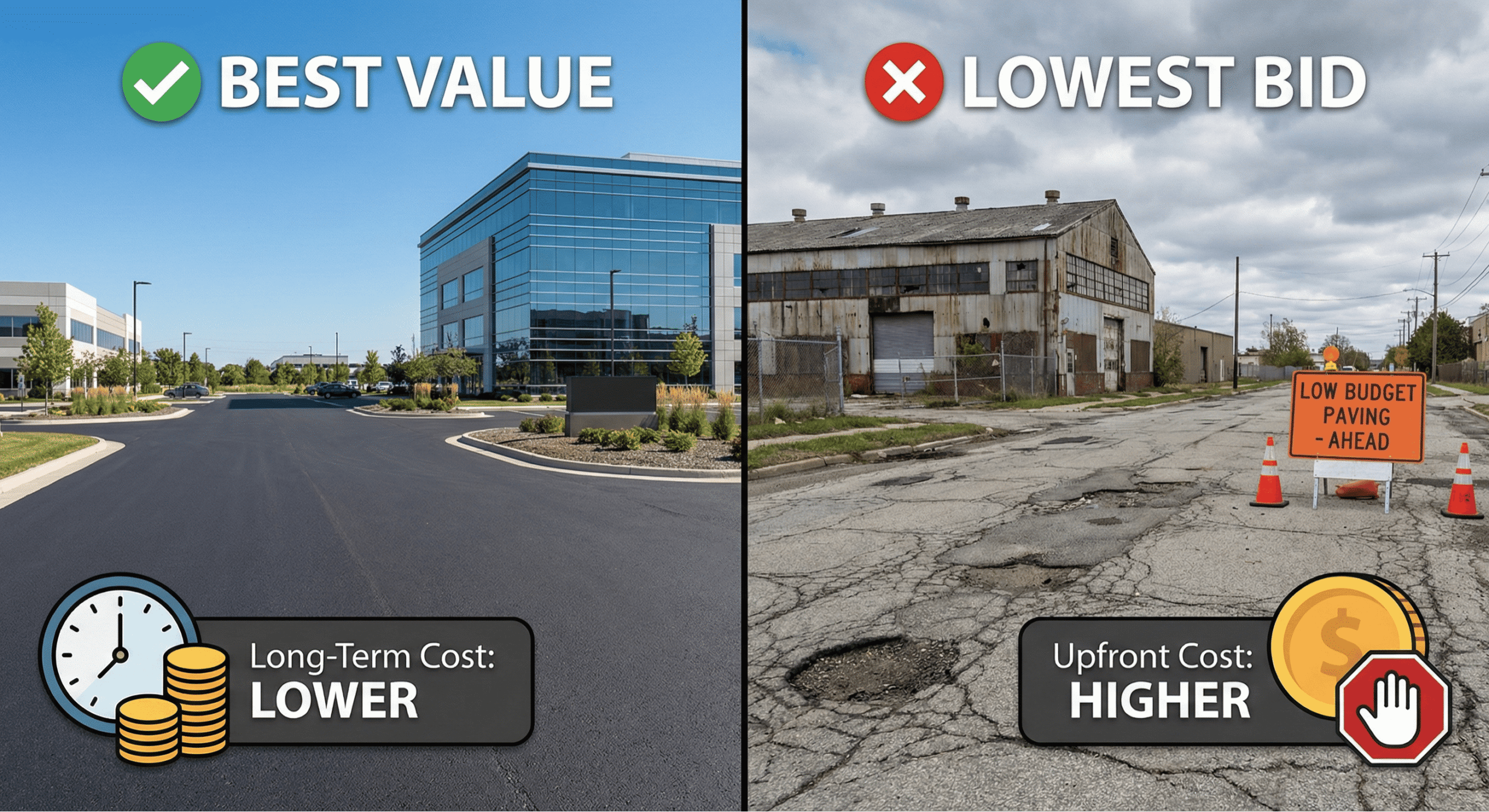
When planning any residential or commercial paving project, the question often boils down to this: asphalt or concrete? Choosing the right surface affects not just the appearance of your space but also long-term performance, maintenance, and budget.
At Asphalt Coatings Company, we help clients make informed decisions based on our experience, site conditions, and their specific goals. This guide walks you through every factor that should influence your choice.
Asphalt vs Concrete: What’s the Difference?
Understanding the core materials and characteristics of asphalt and concrete is the first step in selecting the best surface for your needs.
Material Composition and Construction Basics
Asphalt is a flexible pavement made from bitumen (a petroleum product) mixed with aggregate (crushed stone, sand, or gravel). It’s laid hot and compacted for immediate use. Asphalt’s flexibility makes it ideal for areas with shifting soils or heavy freeze-thaw cycles.
Concrete, by contrast, is a rigid pavement made from Portland cement, water, and aggregates. It requires curing time to reach full strength. Concrete excels in hot climates and areas that require higher load capacity over extended periods.
Asphalt surfaces are generally black and absorb heat, while concrete is lighter in color and reflects sunlight. Each has its method of installation and lifespan considerations.
Cost Comparison: Budgeting Over Time
Cost is often the deciding factor, but understanding both the initial price and long-term expenses helps clarify the better investment. For instance, you should compare asphalt milling vs full repaving cost.
Installation Cost and Long-Term Budgeting
Asphalt is usually less expensive to install, with average costs ranging from $3 to $5 per square foot. It’s quicker to lay and can be ready for traffic within 48 hours. However, it requires regular maintenance, such as sealcoating every 3–5 years.
Concrete, while more expensive upfront ($6 to $10 per square foot), often has lower maintenance costs over time. It doesn’t require sealcoating, but crack and joint repairs can be more expensive.
| Feature | Asphalt | Concrete |
| Initial Cost | $3–$5 per sq. ft. | $6–$10 per sq. ft. |
| Lifespan | 15–20 years | 30–40 years |
| Maintenance Frequency | Every 3–5 years (seal coat) | Occasional joint/crack repair |
| Repair Cost | Lower | Higher |
| Installation Time | 1–3 days | 3–7 days (plus cure time) |
If the budget is tight now, asphalt offers a quicker and more affordable start, while concrete provides better value in the long run.
Durability, Maintenance & Lifespan
The longevity and resilience of a paving surface depend heavily on usage and environmental factors. Let’s break down the key maintenance and durability features.
Performance Under Pressure and Over Time
Asphalt holds up well under repeated freeze-thaw cycles due to its flexibility, but it is more susceptible to softening in extreme heat. Cracks, potholes, and surface wear are common over time but relatively inexpensive to fix, especially with cost effective ways to fix asphalt damage.
Concrete is more rigid, which gives it superior load-bearing capacity and a longer lifespan. However, it’s more prone to cracking in cold climates and may require joint sealing to prevent water intrusion.
Routine maintenance keeps both materials functioning well; however, asphalt requires more frequent attention, while concrete requires strategic repairs to extend its lifespan.
Installation Process & Timing
Timelines and processes can significantly impact the convenience and scheduling of your paving project.
What to Expect During Installation
Asphalt installation involves grading, laying a gravel base, heating and applying asphalt mix, and compacting it into place. It typically takes 1–3 days and is traffic-ready within 48 hours.
Concrete installation is more time-consuming. After grading and preparing the subbase, concrete is poured and must cure for 5–7 days before it can handle full loads. Complex finishes may extend this window.
Weather plays a role, too. Asphalt can be challenging in colder weather, whereas concrete has stricter moisture and temperature requirements during installation.
Aesthetic & Functional Variations
Both asphalt and concrete can offer more than just a basic surface. Let’s explore how they can be customized to fit your design and safety needs, including the best colors and designs for parking lot striping.
Customization and Safety Features
Concrete offers a range of decorative options through stamping, coloring, and exposed aggregate finishes. These finishes not only enhance curb appeal but also improve slip resistance.
Asphalt typically has a clean, dark appearance. While limited in decorative styles, colored asphalt and surface texturing options can improve visibility and traction, especially in commercial settings.
Functionally, concrete’s light reflectivity can help reduce heat buildup, while asphalt’s darker surface hides stains better and enhances line striping visibility.
Use-Case Suitability
Selecting the right paving surface depends mainly on the type of use and traffic conditions.
Which Projects Benefit Most from Each Material
Asphalt is excellent for:
- Residential driveways
- Commercial parking lots
- Roadways and highways
Concrete is ideal for:
- Industrial loading zones
- Commercial entrances
- Sidewalks and curbs
Asphalt’s flexibility benefits lighter to moderate traffic, while concrete handles high loads and stationary pressure (like parked trucks) more effectively.
Base Preparation & Substrate Considerations
Under every successful paved surface is a well-prepared base. Here’s how the foundation impacts the longevity of your surface.
Importance of Proper Groundwork
Whether using asphalt or concrete, both require:
- Stable subgrade (compacted soil)
- Gravel base layer for drainage
- Compaction testing to ensure load-bearing ability
For asphalt, poor compaction leads to depressions and rutting. For concrete, weak subgrades increase the risk of cracking. In either case, inadequate preparation shortens the lifespan and increases repair costs. This highlights why understanding asphalt paving vs concrete which lasts longer is important.
Environmental & Climate Impacts
Modern paving also considers sustainability and climate adaptability. Here’s how each material measures up.
Sustainability and Climate Performance
Asphalt is 100% recyclable, and reclaimed asphalt pavement (RAP) is commonly reused in new surfaces. However, it absorbs more heat, contributing to the formation of urban heat islands.
Concrete has higher CO2 emissions during production; however, its light color reflects more sunlight, which can improve urban temperature regulation. Pervious concrete options allow water to drain through, reducing runoff.
Both materials have eco-friendly versions, and your paving contractor can guide you on the best solution for your site and climate zone.
Decision Guide: Which Surface Suits You?
There is no universal winner, only what best suits your project.
Decision-Making Table
| Factor | Asphalt | Concrete |
| Budget | Lower initial cost | Higher initial cost |
| Maintenance | More frequent, lower-cost | Less frequent, higher cost |
| Longevity | 15–20 years | 30–40 years |
| Climate Suitability | Better in cold regions | Better in hot/dry regions |
| Aesthetic Options | Limited | Extensive |
| Load Capacity | Moderate | High |
| Installation Time | 1–3 days | 5–7 days (cure time required) |
Evaluate based on your site’s conditions, traffic, climate, and visual preferences. When in doubt, consult a licensed contractor, such as Asphalt Coatings Company.
Why Choose Asphalt Coatings Company?
At Asphalt Coatings Company, we bring over two decades of experience to every paving project. Whether you’re leaning toward asphalt or concrete, we provide expert consultation, proper base preparation, and precision installation. Our certified team ensures your surface is durable, safe, and visually appealing.
- Licensed & insured professionals
- Transparent pricing and timelines
- Local project portfolio
- Maintenance and repair plans
- High client satisfaction ratings
We don’t just pave; we partner with you to build surfaces that last.
Frequently Asked Questions
Which surface requires less downtime after installation?
Asphalt requires less downtime, often being ready for use within 48 hours. Concrete needs a curing period of 5–7 days.
Can asphalt be installed during the winter months?
Asphalt installation is temperature-sensitive and not recommended during cold weather unless special mixes and equipment are used.
Is colored asphalt as durable as standard black asphalt?
Yes, but the color can fade over time due to exposure to UV rays. Protective sealcoating helps maintain appearance.
Does concrete work well for sloped driveways?
Yes. Concrete’s rigidity and surface texture options provide good traction and structural integrity on inclines.
How does traffic volume affect material choice?
Higher traffic volumes with heavier loads favor concrete due to its structural strength, while asphalt is suitable for lower-to-moderate traffic zones.
Build it Right from the Ground Up with Us.
Choosing between asphalt and concrete doesn’t have to be a difficult decision. With Asphalt Coatings Company on your side, you gain the insight and technical know-how needed to make the best long-term choice for your space.
Reach out today for a custom quote or site evaluation, and let’s get your project started the right way.



